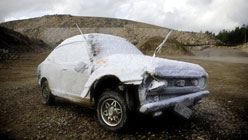However, if you’re like the rest of us and need to find sources of funding for projects, travel, research, and time for intense studio work, then you’ll want to sharpen your writing ability so that you can craft applications that will allow you to buy the materials, tools, and time needed to push your practice to a new level. While I agree that an art career is based mostly on the quality of the work, you also need to be able to explain very clearly why it’s important to fund your artistic development. Remember that there are many talented artists out there, and they will be your competition; when choosing among several worthy candidates, a granting agency will consider many factors, and the ability to express your ideas clearly and persuasively is chief among them. An artist I know who recently sat on a grant panel told me, “In reviewing applications, we quickly narrowed it down to a few shining candidates based on the quality of their images. In the end, however, it was the clarity of the writing that made the final selections possible; and we went with the applicant that was best able to present her project in a way that we could easily understand and visualize.”

Maarit Suomi-Väänänen, In a Musty, Misty Thicket (Pöheikön Hönkä), 2012.
I recommend you check out The Artist’s Guide to Grant Writing by Gigi Rosenberg; although the book’s focus is specifically on grants, I think a lot of the information translates to other kinds of applications as well. I had the opportunity to meet Ms. Rosenberg in Portland, Oregon many years ago, and I can attest to her enthusiasm and encouragement in addition to her wealth of knowledge about the grant application process. If you want to get a sense for what she covers in the book, there’s a free PDF on her website that lays out her own path to successful grant writing and includes a few basic tips on navigating the grant application process. Some of her helpful advice includes: “Use the grant-writing process to clarify where you want to go, so that even if one grant application doesn’t succeed, you gain something very valuable — your action plan… Ask for help. Don’t write your applications and assemble work samples in isolation… Research the funder so you match what you want with the needs and interests of the people who sign the checks… Write and rewrite, have conversations, let the application sit, edit, and edit again until you wring out the words that describe the who, what, when, where, why, and how of your project.” All good advice, no matter what kind of application you’re working on. You can also find similar advice here, and some regional arts funders will hold information sessions and application prep workshops in advance of their deadlines, so review funders’ websites carefully to see what assistance they might offer.
Many artists use applications for grants and residencies to keep them on track in their practice. Having to meet multiple deadlines over the course of each year means you’ll be constantly writing about what you’re doing, which has three main benefits: first, a regular writing practice means that you’ll be continuously strengthening your writing skills; second, writing about your work will clarify your ideas and direction; and third, you can often recycle the same language for multiple or successive applications (including for exhibition proposals), meaning that you can refine your words instead of starting from scratch with each new application. Maarit Suomi-Väänänen, a Finnish artist and filmmaker, says, “I don’t have gallery representation, I produce all of my films independently. I’m an application machine; I do them all the time. My work depends on that, so I have to take it seriously. Grant application deadlines keep me writing constantly. I write maybe fifteen or twenty applications a year — grants, distribution, residencies. From post-its and my journal and other notes, I make a mind-map and use that writing to begin a grant application.”
For any application, you have to do your research and consider the reader. London-based sculptor Briony Clarke says, “I’ve applied for over a hundred grants and had about twenty-five funded. The money has been used for everything from creating a piece of artwork (so, small amounts) all the way to creating large-scale events that have enabled me to bring in other artists. The most important part of writing a grant is being clear about your aims and really finding a way of making it accessible and relevant to the granting institution. For example, for the Arts Council England, you have to have a project that has participatory involvement or engagement, so I would only apply if the work included that. You have to find the right grant to apply for. You also have to be careful that the terminology you use doesn’t alienate the reader. Don’t shoot yourself in the foot by using language that the grant funder can’t relate to.”




